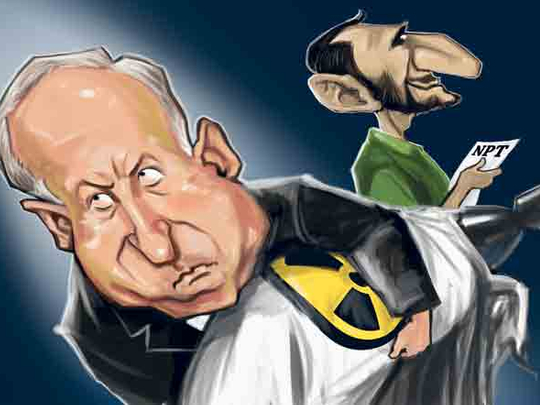
With the help of friendly nations, Iran is playing a smart game. In an effort to take the heat off its nuclear programme, Tehran has agreed in principle to accept a uranium exchange scheme proposed by its allies Turkey and Brazil. Under the scheme, Iran would swap its low-level enriched uranium for nuclear fuel rods enriched abroad to a maximum level of 20 per cent, required to produce radioisotopes for medical use.
Although Iran, as a signatory to the Nuclear Non-Proliferation Treaty (NPT), has the right to enrich uranium to such levels to meet its energy needs, it is considering the scheme to allay suspicions that it is planning to build a bomb. In particular, it is keen to ward off additional sanctions currently being mulled in the UN Security Council, to which China and Russia are opposed in varying degrees.
Uranium enrichment is the nub of the long dispute between Iran and western powers — spurred on by Tel Aviv, which views Iran as an existential threat. Tehran insists that its programme is peaceful and maintains there is no evidence to suggest otherwise. That is, indeed, the case, although a recent International Atomic Energy Agency (IAEA) Board of Governors Report dated February 18 discloses concerns that "Iran has not provided the necessary cooperation to permit the Agency to confirm that all nuclear material in Iran is [used] in peaceful activities."
Iran's agreement to a uranium swap with Brazil — that would take place on the Iranian-Turkish border — would go a long way to putting the nuclear watchdog's doubts to rest. But this would be unlikely to pacify the US or Israel, which believe that Tehran is trying to buy time.
However, were an uranium-exchange programme to proceed, Iran's detractors may be loath to question the credibility of Nato member Turkey or Brazil, which is a serious contender for permanent membership of an expanded UN Security Council. Both Turkey and Brazil have rebuffed anti-Iranian sanctions. Brazil's President Luiz Inacio Lula Da Silva asserts that "peace in the world does not mean isolating someone" and is poised to visit Iran on May 15 to discuss the proposed uranium exchange.
In the meantime, Iranian President Mahmoud Ahmadinejad travelled to New York last week to participate in a Nuclear Non-Proliferation Treaty Summit, where he railed against western powers for attempting to deny his country the right to nuclear energy while turning a blind eye to Israel's alleged stockpile of nuclear weapons. He also accused Washington of supporting terrorist networks as well as "threatening non-nuclear states".
Unfortunate tone
While many developing nations agree with Iran's nuclear arguments, several objected to Ahmadinejad's strident anti-American sentiment and felt obliged to distance themselves from the Iranian delegation rather than get into Washington's bad books.
As usual, British, French and US delegations walked out from the get-go. In a surprise move, a US official did, however, attend a dinner for all 15 UN Security Council members hosted by Iran's foreign minister, which was the first time since 1979 that America has been officially represented at such an event.
For the moment, Tehran is still in the international doghouse. But its acceptance of the uranium swap could prompt a turnaround with the spotlight then falling on Israel's policy of nuclear ambiguity as well as its failure to sign up to the NPT.
It seems that Israel's right-wing government, led by Benjamin Netanyahu, has never heard of the adage "people in glass houses shouldn't throw stones". Israel refuses to admit the existence of its nuclear weapons programme or its massive nuclear arsenal, yet threatens to destroy the nuclear facilities of an NPT signatory that does open its doors to IAEA inspection and monitoring.
Israel's glaring hypocrisy has thrust its own nuclear weapons into the forefront, sparking calls for a nuclear-free Middle East backed by US President Barack Obama who is working closely with Egypt to arrange a conference around the topic. Obama should be applauded for taking such a courageous step in the face of vehement opposition at home when it is clear that the initiative is directed at the region's only nuclear-armed nation — Israel.
On Wednesday in New York, all five permanent members of the UN Security Council issued a written commitment to a Middle East devoid of nuclear weapons, stating: "We are ready to consider all relevant proposals in the course of the NPT Review Conference in order to come to an agreed decision aimed at making concrete steps in this direction." The statement also calls for all states to join the NPT and for those with nuclear weapons to disarm — which, again, applies only to Israel.
In this case, Ahmadinejad should acknowledge his US counterpart's unprecedented stance and quit his anti-American theatrics. This is a moment when goodwill and cooperation could be mightier than harsh rhetoric. An Iranian decision to return to the fold would take the wind out of Israel's sails and leave it out on a limb. This window of opportunity won't last forever. It shouldn't be missed!
Linda S. Heard is a specialist writer on Middle East affairs. She can be contacted at lheard@gulfnews.com.










